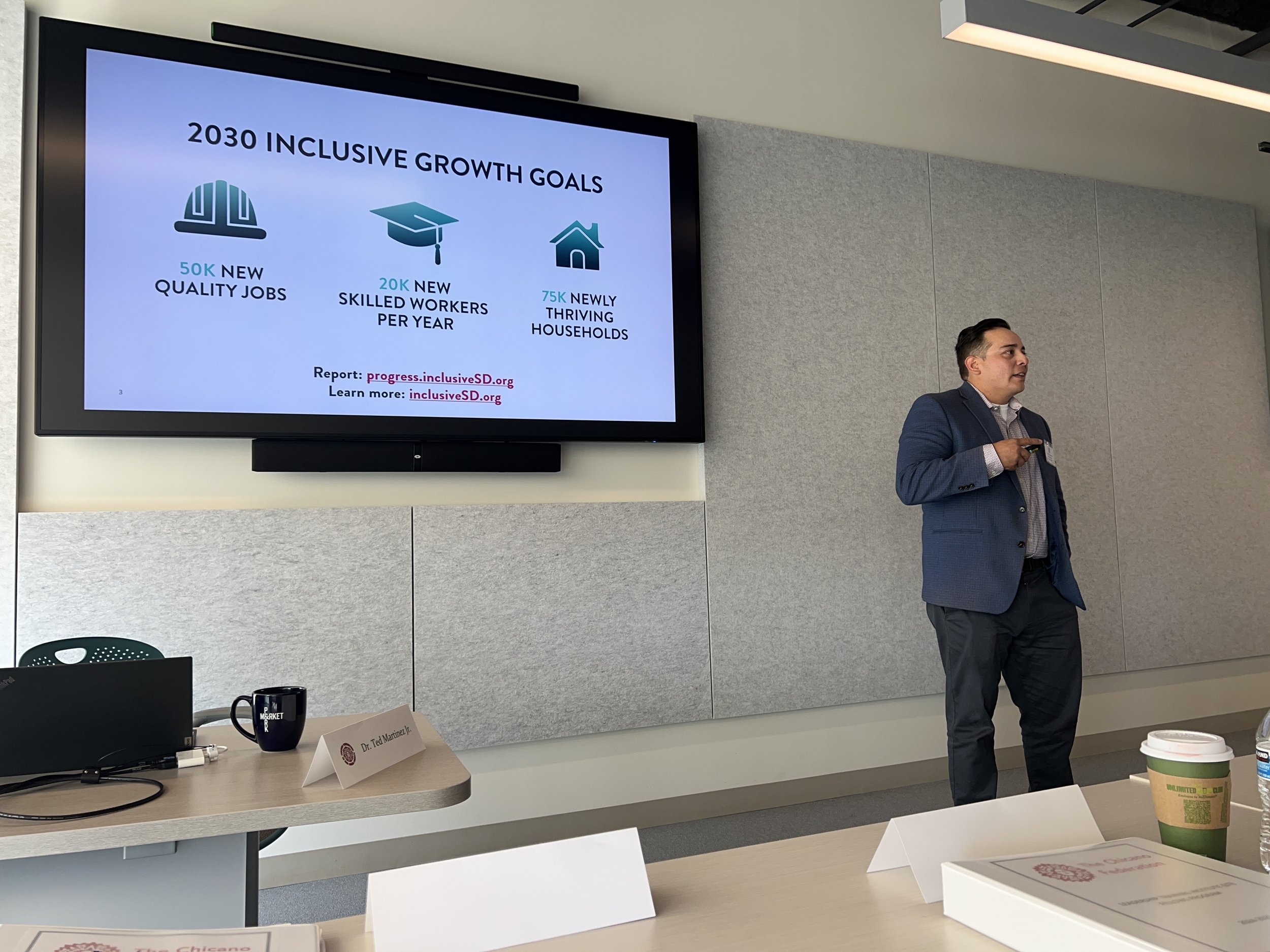Session 2 of LTI Fellows Program: Equality, Equity, and Social Justice
On October 12, 2024, the LTI Fellows gathered at UC San Diego Park and Market for our second session, where Dr. Ted Martinez Jr., Executive Director of the LTI Fellows Program, led a discussion on equality, equity, and social justice. We were fortunate to have experts share their knowledge and findings on civil rights injustices and data related to San Diego County's inclusive growth, with a deep dive analysis of the county's demographic landscape. The goal of the session was to understand and develop strategies to improve systemic inequities in San Diego County, which aligns with our efforts at Teens Rise Foundation.
Our first speaker, Adriana Jasso, Program Coordinator for the U.S.-Mexico Border Program at the American Friends Service Committee (AFSC), presented her work with migrant communities. As someone who was raised by a single mother who immigrated to San Diego from Mexico, I felt a personal connection to Jasso's presentation. Through images, Jasso shared how she and her team provide humanitarian aid to migrants held in open-air detention sites, known as Whiskey-8, located along the San Diego-Mexico border.
Since the fall of 2023, migrants have been held in these open-air detention sites, without access to basic needs such as food, water, and medical care. AFSC has stepped in to provide aid, setting up a station that offers ongoing basic needs supplies, electricity, and an emergency medical station. The organization supports individuals and families from various countries, including Brazil, Guatemala, Bolivia, China, Romania, Mexico, Egypt, and India, who are seeking asylum and facing dehydration, hunger, and other challenges. AFSC works tirelessly to meet their basic needs and educate them on the process and what to expect once they are in custody of Border Patrol.
It was heartbreaking to learn that just six miles from my home, there are infants, families, and elders seeking asylum in inhumane conditions. AFSC's message is clear: they will not give up advocating for the end of migrants being held in open-air detention sites, a daunting and inspiring mission.
After a break, we welcomed our second speaker, Teddy Martinez III, Senior Manager of Research at the San Diego Regional Economic Development Corporation (EDC). Teddy presented on San Diego's 2030 Inclusive Growth Framework, highlighting data that demonstrate the county's progress toward creating jobs and economic inclusion. However, the data also show that these jobs are not inclusive to lower-income and minority communities.
In 2021, post-pandemic San Diego County saw an increase in jobs and post-secondary education completions, but the data reveal that these opportunities are not accessible to all. Small businesses in San Diego employ nearly 61% of the workforce, but pay 40% lower on average than larger businesses. Lower-income jobs are held by 65% of people of color and 56% of women.
The San Diego K-12 demographics report shows that Hispanics make up 49% of the future workforce, but currently hold 19% of the innovation economy workforce. Despite representing 45% of community college students, Hispanics face barriers to competing for these in-demand innovative jobs. The data also reveal that 60% of low-income students do not meet English standards, and 74% do not meet math standards. Only half of Latino students in San Diego meet the a-g requirements to be college-ready.
At Teens Rise Foundation, we are driven to address these inequalities and are committed to addressing disparities in educational and life opportunities for underserved youth facing unique language and financial barriers. We are empowered to ensure our students are thriving and positioned to compete for in-demand innovative jobs.
The session reinforced the importance of inclusionary efforts during our students' educational life cycle, and we are dedicated to making a positive impact in the lives of our students and the broader community.
LTI 2024 - 2025 Session 2 Group Photo
Adriana Jasso, Program Coordinator of US-Mexico Border Program at American Friends Service Committee
Teddy Martinez III, Senior Manager of Research at the San Diego Economic Development Corporation



